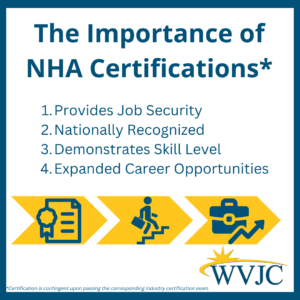Content Updated 05/08/2024
Are you looking for a healthcare training program that provides valuable training through classroom development, hands-on training, National Healthcareer Association certification* preparation, and an externship experience? If these qualities are necessary for your education, then a WVJC allied healthcare training program could be a great fit for you! 
Earning industry certifications can help set you up for a successful career in healthcare, so keep reading to learn more about why choosing a training program that prepares you to take National Healthcareer Association (NHA) certifications is important!
What is the National Healthcareer Association?
The National Healthcareer Association is a nationally recognized certification body that awards healthcare professionals with industry-specific certifications. Since its establishment in 1989, the NHA has awarded over one million certificates across the United States in eight different fields, including:
Certified Clinical Medical Assistant (CCMA)
A clinical medical assistant is responsible for assisting healthcare professionals in clinical settings by performing tasks such as taking patient vital signs, preparing examination rooms, collecting and processing specimens, and providing basic patient care.
Certified Pharmacy Technician (CPhT)
A pharmacy technician supports pharmacists in filling medications and providing pharmaceutical services by assisting in prescription processing, managing inventory, compounding medications, and providing customer service.
Certified Phlebotomy Technician (CPT)
A phlebotomy technician specializes in drawing blood from patients for medical testing, transfusions, or donations and ensures proper labeling and handling of blood samples to maintain accuracy and patient safety.
Certified Medical Administrative Assistant (CMAA)
A medical administrative assistant handles various administrative tasks in a healthcare setting, such as scheduling appointments, managing patient records, coordinating communication between healthcare professionals and patients, and handling billing and insurance-related matters. They ensure that operations run smoothly and support the efficient functioning of the healthcare facility.
Certified EKG Technician (CET)
An EKG (electrocardiogram) technician specializes in conducting diagnostic tests to measure and record the electrical activity of a patient’s heart using an EKG machine. They assist in detecting and diagnosing heart conditions. They ensure proper electrode placement, operate the EKG equipment, and provide accurate results to healthcare professionals for interpretation.
Certified Electronic Health Records Specialist (CEHRS)
An electronic health records (EHR) specialist manages and maintains digital patient health records, ensuring data accuracy, privacy, and security. EHR specialists also assist healthcare professionals in accessing and utilizing electronic health information for efficient patient care and treatment planning.
Certified Billing and Coding Specialist (CBCS)
A billing and coding specialist assigns appropriate codes to medical procedures and diagnoses, ensuring accurate and timely submission of insurance claims and facilitating the financial reimbursement process for healthcare providers while adhering to coding guidelines and regulations.
Certified Patient Care Technician/Assistant (CPCT/A)
A patient care technician provides direct care and assistance to patients in medical settings. Some possible tasks include monitoring vital signs, assisting with personal hygiene, collecting specimens, administering basic treatments, and offering emotional support to patients under the supervision of healthcare professionals.
Why are National Healthcareer Association Certifications Important?
The National Commission for Certifying Agencies (NCCA) recognizes NHA’s certification exams. The NCCA’s recognition proves that the certification exams have met national standards for each healthcare industry. As a result, many employers in the medical field require or encourage NHA certifications for potential employees. Due to the large number of employers who recognize NHA certifications, obtaining them, along with your diploma or degree, can show an employer that you possess the knowledge and skills to perform the job confidently and competently.
By earning an industry-specific certification, you may also gain an advantage over your peers who have yet to earn a certification. When your degree or diploma is combined with an NHA certification, the two could provide you with career opportunities, financial stability, and job security.
How WVJC Can Help You
WVJC’s allied healthcare training programs offer valuable career preparation through classroom development, hands-on training, and an externship. They also help students prepare for industry-specific certification* exams, which will help them begin their careers.
In addition to your in-class training at WVJC, it is important to prepare independently. The NHA’s website provides free test plans for each profession. The NHA also has a mobile app for both Apple and Android users with flashcards and a content mastery tracker.
An additional benefit of choosing a WVJC healthcare training program is lifetime access to our career management department, whose services include support for current students and WVJC alums. The career management team assists with externship placement, resume and cover letter writing, interview preparation, job searching, and other support services for students and graduates.
How To Get Started On Your Journey Today
Begin your journey towards a better future by requesting information for one of WVJC’s accelerated healthcare programs today by Requesting Information!
*Certification is contingent upon passing the corresponding industry certification exam.
